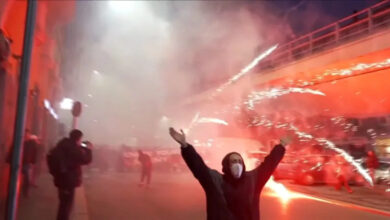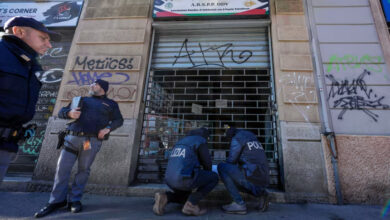
Italy’s anti-establishment 5-Star Movement hooked up with conservative parties on Saturday to elect the speakers of both houses of parliament, but there was no sign yet they might extend this pact and form a government.
The March 4 national election ended in a hung parliament, with the 5-Star becoming the largest party and a rightist alliance, including ex-premier Silvio Berlusconi’s Forza Italia party and the anti-migrant League, emerging as the biggest bloc.
After days of behind-the-scenes talks, the two factions joined forces to elect 5-Star heavyweight Roberto Fico president of the lower house and Forza Italia veteran Elisabetta Casellati president of the Senate – both highly prestigious posts.
The conservative alliance came close to collapse on Friday after the League sided with 5-Star to reject Forza Italia’s first choice for the Senate position, but hasty overnight negotiations patched up the row, at least for now.
“I am very happy, moved and proud that parliament has started to work and that the centre-right has held together,” League leader Matteo Salvini said after Saturday’s twin votes.
The election of the speakers opens the way for formal government consultations, which will be led by President Sergio Mattarella and are expected to start early next month.
Later on Saturday Prime Minister Paolo Gentiloni officially handed in his resignation and that of his government to Mattarella, as normally happens in Italy when a newly-elected parliament appoints its speakers.
Gentiloni, however, will remain in place to take care of day-to-day operations until a new government is formed, the secretary of the president said in an emailed statement.
FLEXIBILITY
The 5-Star and the right have enough seats in parliament to govern Italy, but there are many impediments to such a deal in terms of policy mismatches and personality clashes.
“Here we have seen that there are (parliamentary) forces which carry considerable weight. But for us, government is something different,” said Giorgia Meloni, head of the far-right Brothers of Italy party which is in the conservative alliance.
“For us, 5-Star absolutely does not represent any sort of guarantee, just like the Democratic Party,” she added, referring to the centre-left PD which lost power in the March 4 election.
Nonetheless, Saturday’s ballots showed that the 5-Star is evolving. It used to excoriate such parliamentary deal-making as old-style politics, so by agreeing to a deal in both houses it suggested it might prove more flexible in future.
The election of the speakers also represented a blow to Berlusconi, who dominated Italy’s centre-right for almost 25 years but must now play second fiddle to Salvini after the League overtook his Forza Italia party in the March 4 vote.
He accused Salvini of betrayal on Friday after the League sided with the 5-Star over the speaker nominations. On Saturday Berlusconi altered his tone, saying he still trusted Salvini and promised to work for the good of Italy, the euro zone’s third largest economy.
Post-election opinion polls have shown support for Forza Italia collapse further in favor of the League, which has promised a fierce clampdown on illegal immigration and a hefty reduction in both business and personal taxes.
Backing for the 5-Star has also climbed further over the past three weeks, with the movement promising to introduce a generous “Citizen’s Wage” to help the poor and jobless.
Both the League and 5-Star have voiced fierce hostility to EU budget rules and markets are likely to be spooked by any sign they might form a coalition. However, their divergent economic platforms represent a serious hurdle to alliance deals.




